
O>2aE⊙ Unit 6 Etiquette and Manners The Culture of Major English-speaking Countrie
Unit 6 Etiquette and Manners The Culture of Major English-speaking Countries
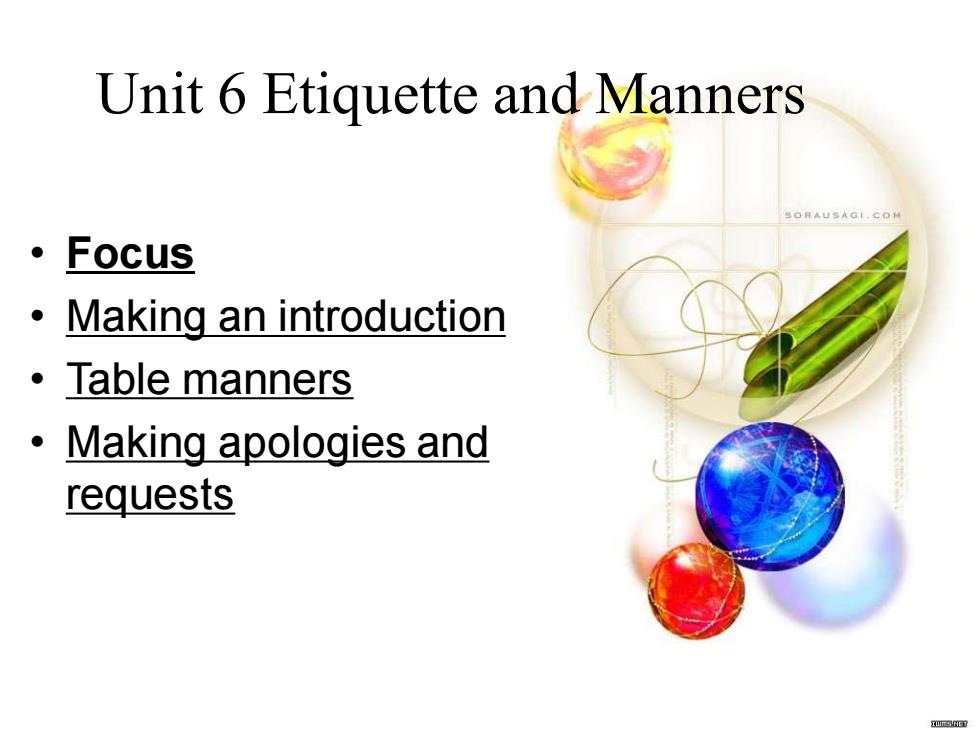
Unit 6 Etiquette and Manners SORAUSAG.CO利 ·Focus Making an introduction ·Table manners 。 Making apologies and requests
Unit 6 Etiquette and Manners • Focus • Making an introduction • Table manners • Making apologies and requests
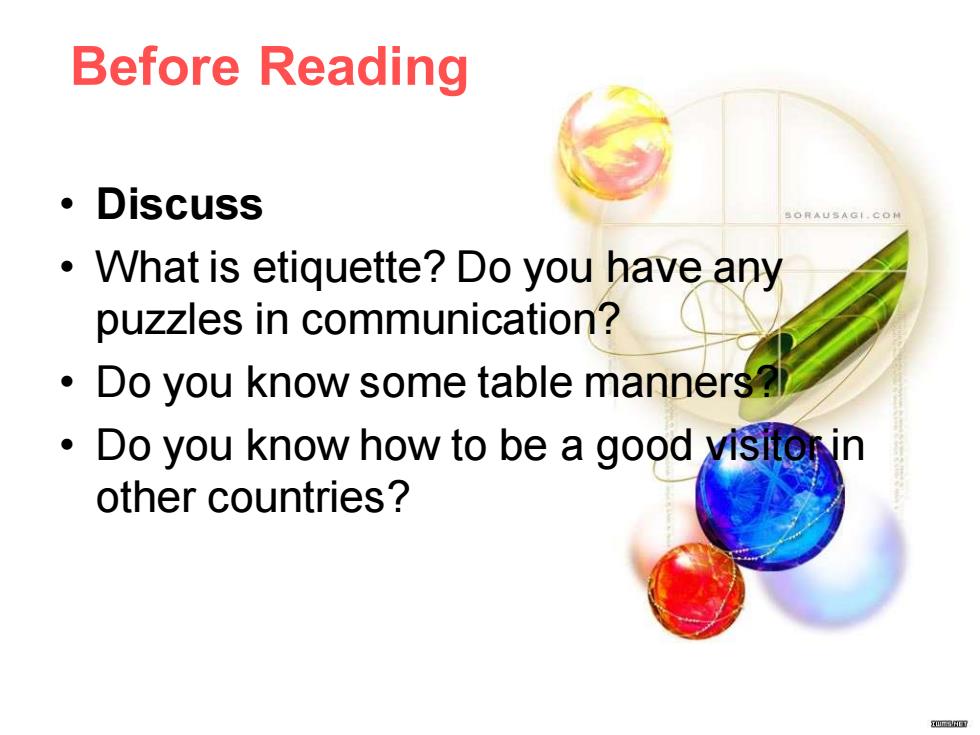
Before Reading ·Discuss What is etiquette?Do you have any puzzles in communication? Do you know some table manners? Do you know how to be a good yisitor in other countries?
Before Reading • Discuss • What is etiquette? Do you have any puzzles in communication? • Do you know some table manners? • Do you know how to be a good visitor in other countries?
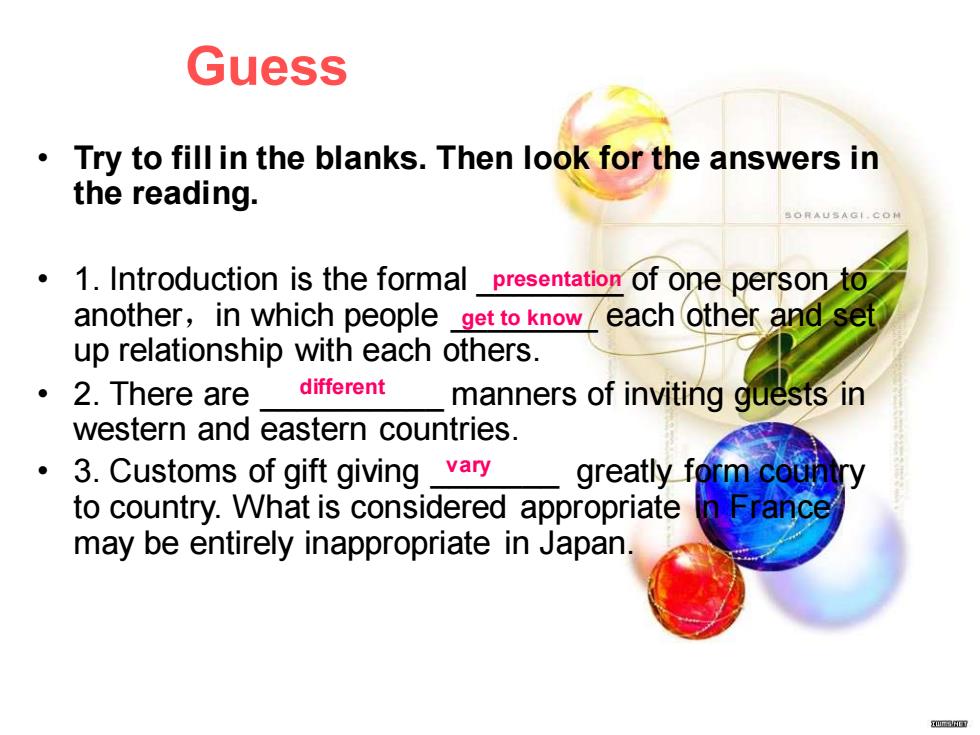
Guess Try to fill in the blanks.Then look for the answers in the reading. 1.Introduction is the formal presentation of one person to another,in which people get to know/each other and set up relationship with each others. 2.There are different manners of inviting guests in western and eastern countries. 3.Customs of gift giving vary greatly form country to country.What is considered appropriate in France may be entirely inappropriate in Japan. Z室国
Guess • Try to fill in the blanks. Then look for the answers in the reading. • 1. Introduction is the formal ________ of one person to another,in which people ________ each other and set up relationship with each others. • 2. There are __________ manners of inviting guests in western and eastern countries. • 3. Customs of gift giving _______ greatly form country to country. What is considered appropriate in France may be entirely inappropriate in Japan. presentation get to know different vary
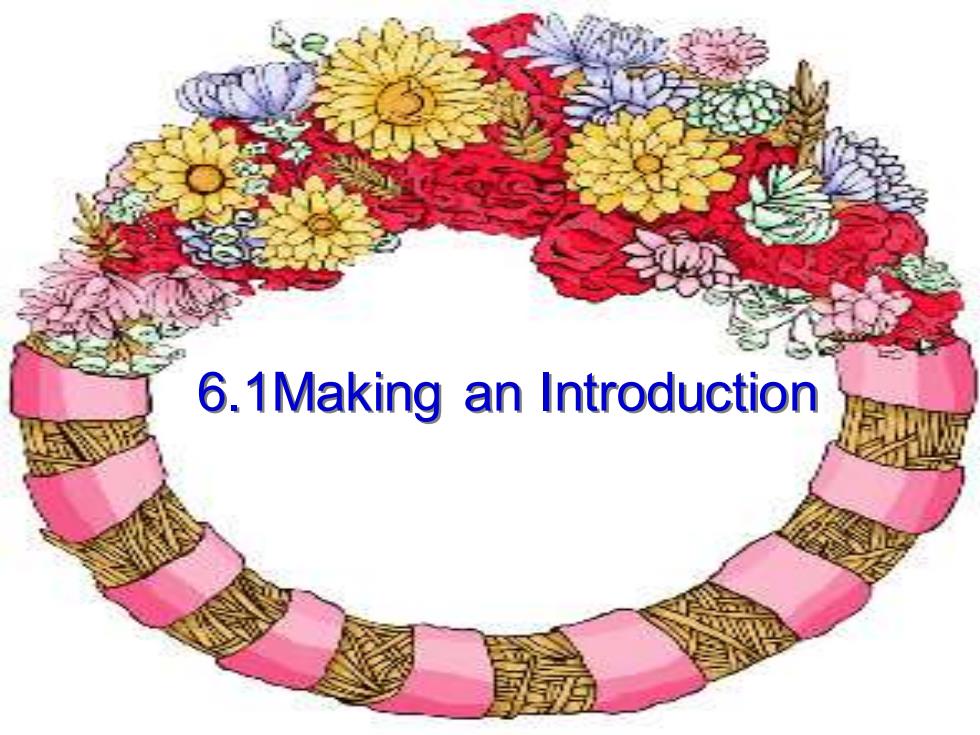
6.1Making an Introduction
6.1Making an Introduction
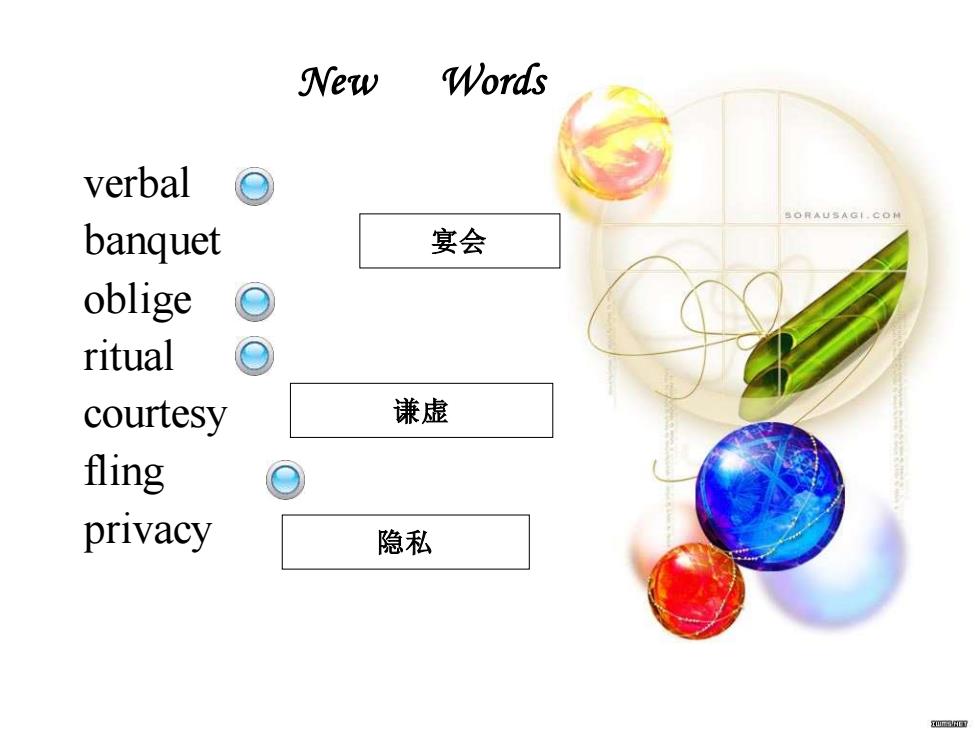
New Words verbal SORAUSAGI.COM banquet 宴会 oblige ritual courtesy 谦虚 fling privacy 隐私 国
New Words verbal banquet oblige ritual courtesy fling privacy 谦虚 宴会 隐私

Verbal: adj.1.词语的,言语的,字句的2.口头的(而非书面)3.动词的 n.1.非谓语动词;非限定动词 Non-verbal 非语言性的沟通(non-verbal):身体语言,文字(Written communication):病历记载
Verbal: adj. 1.词语的, 言语的, 字句的 2. 口头的(而非书面)3. 动词的 n. 1. 非谓语动词; 非限定动词 Non- verbal : 非语言性的沟通(non-verbal): 身体语言,文字(Written communication): 病历记载

Oblige: vt.vi. 1.迫使做;使负义务2.满足请求;施惠 vt. 1.感激2.(根据要求或需要)帮忙,效劳 9 ORAUSAG.CO利 e.g: 1.迫使做;使负义务 We'd be happy to oblige..我们乐于效劳。 Poverty obliged her to live a hard life..贫困迫使她过限苦 的生活。 2.满足请求;施惠 Sorry,Ican't oblige you.很抱款,我不能帮你的忙。 国
Oblige: vt. & vi. 1. 迫使做; 使负义务2. 满足请求; 施惠 vt. 1. 感激2. (根据要求或需要)帮忙,效劳 e.g: 1.迫使做; 使负义务 We’d be happy to oblige.我们乐于效劳。 Poverty obliged her to live a hard life.贫困迫使她过艰苦 的生活。 2.满足请求; 施惠 Sorry, I can't oblige you.很抱歉, 我不能帮你的忙
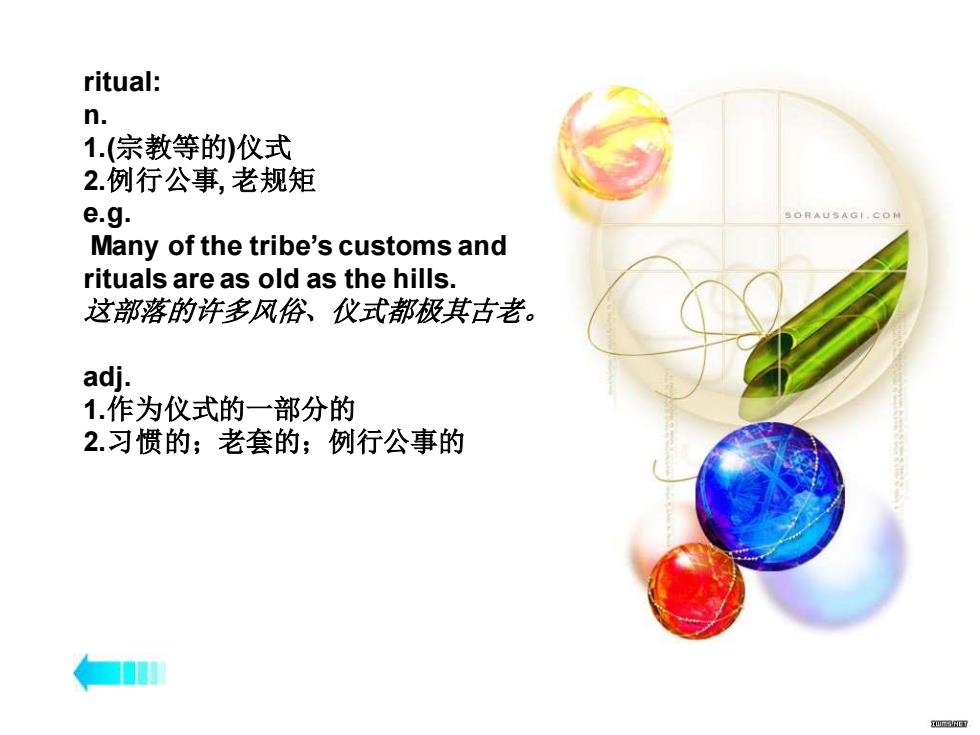
ritual: n. 1.(宗教等的)仪式 2例行公事,老规矩 e.g. 9 ORAUSAG,CO相 Many of the tribe's customs and rituals are as old as the hills. 这部落的许多风俗、仪式都极其古老。 adj. 1.作为仪式的一部分的 2.习惯的;老套的;例行公事的 RORSNE国
ritual: n. 1.(宗教等的)仪式 2.例行公事, 老规矩 e.g. Many of the tribe’s customs and rituals are as old as the hills. 这部落的许多风俗、仪式都极其古老。 adj. 1.作为仪式的一部分的 2.习惯的;老套的;例行公事的
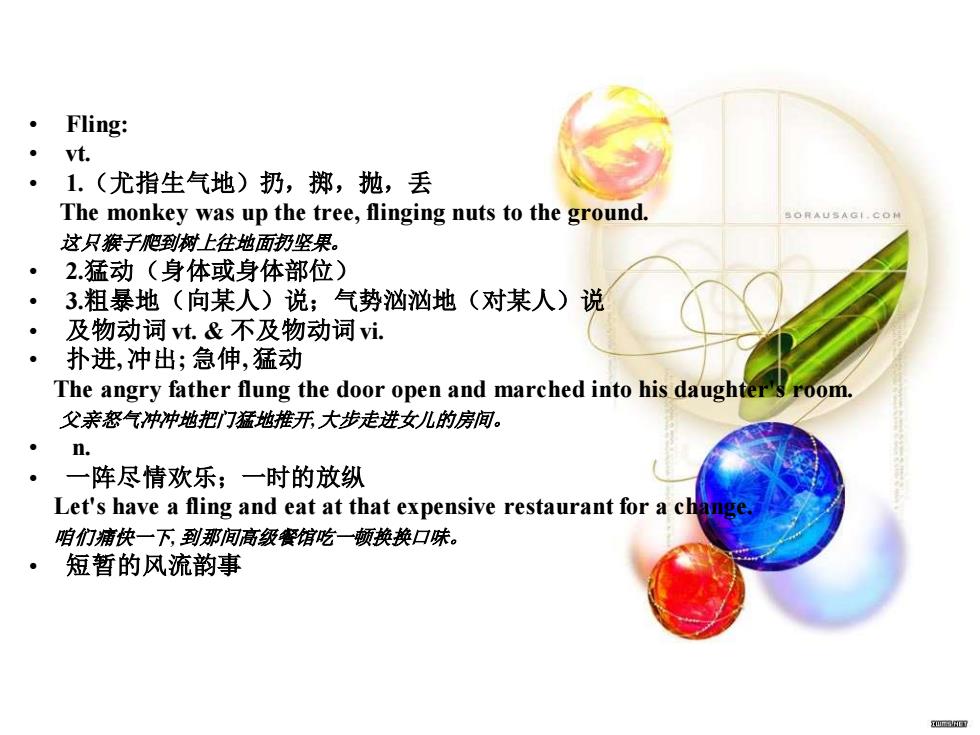
·Fling: vt. 。 1.(尤指生气地)扔,掷,抛,丢 The monkey was up the tree,flinging nuts to the ground. SORAUSAGI.COM 这只猴子爬到树上往地面扔坚果。 2.猛动(身体或身体部位) 。 3粗暴地(向某人)说;气势汹汹地(对某人)说 。 及物动词vt.&不及物动词vi 。 扑进,冲出;急伸,猛动 The angry father flung the door open and marched into his daughter's room. 父亲怒气冲冲地把门猛地推开大步走进女儿的房间。 n. 。 一阵尽情欢乐;一时的放纵 Let's have a fling and eat at that expensive restaurant for a change. 咱们痛快一下到那间高级餐馆吃一顿换换口味。 。 短暂的风流韵事 国
• Fling: • vt. • 1.(尤指生气地)扔,掷,抛,丢 The monkey was up the tree, flinging nuts to the ground. 这只猴子爬到树上往地面扔坚果。 • 2.猛动(身体或身体部位) • 3.粗暴地(向某人)说;气势汹汹地(对某人)说 • 及物动词 vt. & 不及物动词 vi. • 扑进, 冲出; 急伸, 猛动 The angry father flung the door open and marched into his daughter's room. 父亲怒气冲冲地把门猛地推开, 大步走进女儿的房间。 • n. • 一阵尽情欢乐;一时的放纵 Let's have a fling and eat at that expensive restaurant for a change. 咱们痛快一下, 到那间高级餐馆吃一顿换换口味。 • 短暂的风流韵事